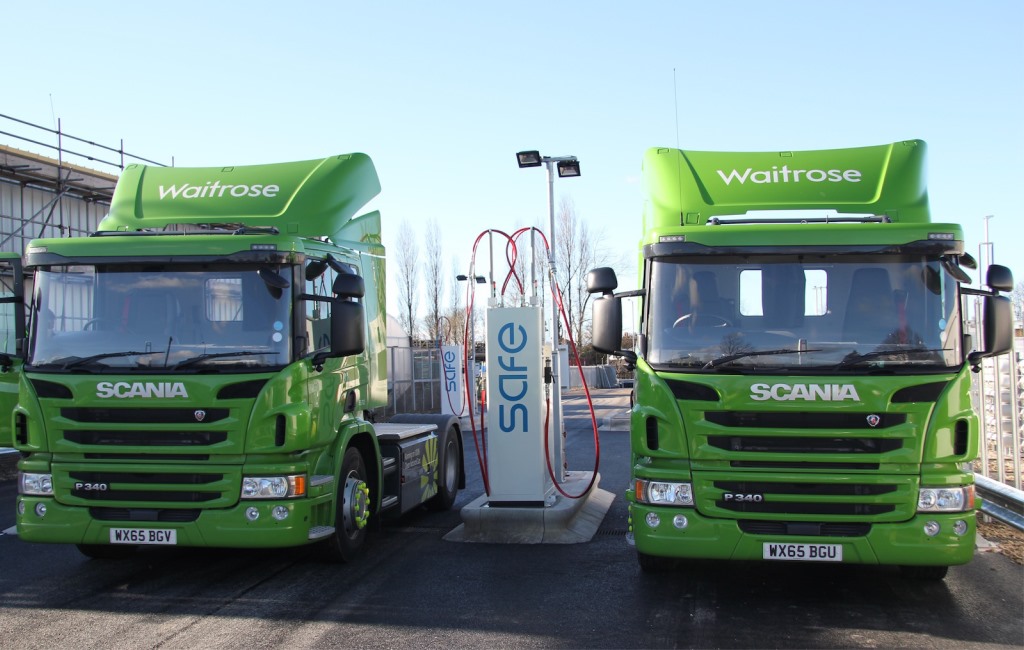New regulations to make road and air transport more environmentally-friendly
- New regulations will increase the amount of renewable fuel blended into the transport fuel mix
- The regulations will also support incentives for the production of novel renewable fuels from waste
- The North-East is a “powerhouse of renewable fuel production” and the sector supports around 1,000 direct jobs in the UK
The Government has introduced new regulations which should see the amount of renewable fuel blended in with petrol and diesel increased.
The new Renewable Transport Fuel Obligation, coming into force at midnight on Sunday, will require fuel companies to more than double the amount of renewable fuel they supply by 2020. It will also introduce a new incentive for the production of novel fuels from wastes, and bring in sectors of transport that are hard to decarbonise, such as aviation.
The Obligation supports fuels including bioethanol and biodiesel, as well as gases such as biomethane and renewable hydrogen.
Transport is now the largest contributor of greenhouse gas emissions in the UK . Unlike other sectors where carbon emissions are decreasing, the contribution from transport continues to grow, and overtook power generation as the largest emitter in the UK economy only last year.
Dr Nina Skorupska CBE, Chief Executive of the Renewable Energy Association, which represents renewable fuel manufacturers said:
“This is an exciting time for renewable transport. These new regulations will fire the starting gun on the UK’s development of novel fuels for aviation and other forms of transport which are hard to decarbonise, and build on our leadership position in the production of renewable fuels for road transport.
“As the transport sector is now the UK’s largest source of greenhouse gas emissions much remains to be done, and increasing the use of renewable fuel will powerfully complement the Government’s policies to support electric vehicle uptake.”
Grant Pearson, Chair of the REA’s Renewable Transport Fuels Group said
“The introduction of these regulations comes as a great relief to domestic manufacturers of bioethanol and biodiesel.
“The North East in particular is a powerhouse of renewable fuel production and the sector is a significant local employer. In the process of making petrol greener, UK bioethanol companies like my own take low-grade wheat from surrounding farms and converts it into a protein-rich animal feed, which substitutes for imported soy products. The higher obligation levels should at some point encourage fuel suppliers to make E10 petrol available. This is the 10% bioethanol blend which today’s cars are manufactured to run on, and which is found in USA, Canada, Australasia as well as in much of Europe.
“All of the biodiesel used in the UK is derived from wastes and residues, and this is expected to continue”
John Baldwin, Chair of the REA’s Biogas Group said
“The prospects are great for increasing the amount of renewable gas used for fuelling heavy goods vehicles. Running these HGVs on green gas reduces carbon emissions by almost 90%, plus it reduces particulates, NOx and noise.
“Fleet operators such as Waitrose and Asda are already converting to renewable gas, their drivers love the new vehicles, and these regulations will encourage more fleets to do so in the future.”
—ENDS—
For more information or to request an interview, please contact:
Daniel Brown
External Affairs Officer
+44 (0)20 7981 0857
[email protected]
Or
- Gaynor Hartnell, Head of Renewable Transport Fuels: 07870 629575
- Grant Pearson, Ensus: +44 (0) 1642 794 037
- John Baldwin, CNG Services: 07831 241217
Notes to editors
The Department for Transport has today (13 April 2018) also released a press release announcing the RTFO.
The Renewable Transport Fuels Obligation compels the larger suppliers of transport fuel (those supplying more than 450,000 litres a year) to source a growing proportion of their fuels from renewable sources.
Changes to the Renewable Transport Fuels Obligation include measures to
- increase in the size of the obligation; since 2013 the obligation has been set at 4.75% but from April this year it will rise to 7.25%, next year it will be 8.50% and it will increase thereafter to reach 12.4% by 2032
- increase the level of GHG savings that fuels must meet in order to qualify as renewable
- limit the amount of food crop-derived fuels that can be counted towards the meeting the obligation – i.e. introduce a “crop cap”
- create an incentive for the production of novel fuels for hard to decarbonise sectors of transport – known as development fuels (effective from 1 January 2019)
- encourage fuels to be produced from renewable electricity (e.g. using wind or solar power to generate hydrogen). In future this will help integrate more renewables onto the system.
About the Renewable Energy Association (REA)
The Renewable Energy Association represents renewable energy producers and promotes the use of all forms of renewable energy in the UK across power, heat, transport and recycling. It is the largest renewable energy and clean technology (including energy storage and electric vehicles) trade association in the UK, with around 550 members, ranging from major multinationals to sole traders.
For more information, visit: www.r-e-a.net

